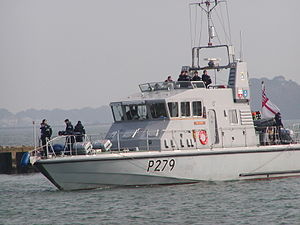1993 Cherbourg incident
| 1993 Cherbourg incident | |||
|---|---|---|---|

HMS Blazer, one of the Royal Navy's craft involved
|
|||
| Date | 26 March – 2 April 1993 | ||
| Location |
Cherbourg, France 49°39′54.70″N 1°40′21.45″W / 49.6651944°N 1.6726250°WCoordinates: 49°39′54.70″N 1°40′21.45″W / 49.6651944°N 1.6726250°W |
||
| Causes | Fishing rights dispute between Britain and France | ||
| Result | Royal Navy ship boarded, ensign burned French trawler captured, skipper arrested |
||
| Parties to the civil conflict | |||
|
|
|||
The 1993 Cherbourg incident were a series of maritime incidents which took place from 26 March to 2 April 1993 between the British Royal Navy and French fishermen as a result of a fishing rights dispute in and around the Channel Islands waters.
The tensions around the Channel Islands waters rose high since September 1992, when the European Union (EU) recognised a six-mile British limit for exclusive fishing rights around the islands. Until then, British and French trawlers operated in the zone without restrictions. The agreement left a three-mile limit from the coastline where only Jersey trawlers could fish, between the three-mile and the six-mile for any British-flagged boat and an outer area between the six-mile and the 12-mile limit where only British and French fishing boats could operate.
The first incident took place on 26 March, when two fishing inspectors from the Channel Islands were illegally taken on the trawler Impatiens to the French port of Barneville-Carteret, after the French fishing boat was challenged by the British fishery vessel HMS Orkney from Guernsey, which confiscated her pots. The inspectors were rescued some hours later by a French coastguard vessel. On 28 March 1993, HMS Blazer was paying a visit to Cherbourg when the local fishermen learned that a boat from their fleet, the La Calypso, had been stopped at sea by a British minesweeper, HMS Brocklesby. The captain of the La Calypso refused to submit and set out for Cherbourg with three British fishery protection servicemen on board. A French port vessel later returned the personnel to Royal Navy control. Eight French trawlers subsequently surrounded the Blazer at 3:00 pm and angry fishermen boarded the ship. According to witnesses, HMS Blazer was seized while manoeuvring outside the port and sailed to Cherbourg harbour by the intruders. Her crew of 16 was forced to remain below the deck for three hours, while the White Ensign was burned by the mob. French authorities subsequently put an end to the situation and forcibly expelled the protesters. The French Navy, meanwhile, dispatched the patrol boat Coriander to Cherbourg. On 29 March a flotilla of 36 French trawlers steamed up to Saint Peter Port in Guernsey, where a preliminary deal was agreed. After the first incidents, the Royal Navy deployed unarmed Royal Marines to conduct any future similar law enforcement operations. The marines were from 40 Commando, based at Taunton in Somerset. The La Calypso was eventually caught by the fishery vessel HMS Jersey and her master was put under arrest in Guernsey on 2 April 1993. The skipper, Michel Mesnage, was released on bail on 3 April. A new incident took place on 30 June 1993, when the Guernsey-based trawler Sara P was seized by the French Navy, and had her pots confiscated.
...
Wikipedia
